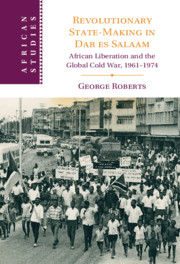Book contents
- Revolutionary State-Making in Dar es Salaam
- African Studies Series
- Revolutionary State-Making in Dar es Salaam
- Copyright page
- Contents
- Maps
- Acknowledgements
- Abbreviations
- Introduction
- 1 The Making of a Cold War City in Eastern Africa
- 2 Revisiting the Politics of the Arusha Declaration
- 3 Dilemmas of Non-Alignment: Tanzania and the German Cold War
- 4 The Assassination of Eduardo Mondlane: Mozambican Revolutionaries in Dar es Salaam
- 5 Tanzania’s ’68: Cold War Interventions, Youth Protest, and Global Anti-Imperialism
- 6 Decolonising the Media: Press and Politics in Revolutionary Dar es Salaam
- 7 Mwongozo: The African Revolution, Reloaded
- Conclusion
- Bibliography
- Index
- African Studies Series
5 - Tanzania’s ’68: Cold War Interventions, Youth Protest, and Global Anti-Imperialism
- Revolutionary State-Making in Dar es Salaam
- African Studies Series
- Revolutionary State-Making in Dar es Salaam
- Copyright page
- Contents
- Maps
- Acknowledgements
- Abbreviations
- Introduction
- 1 The Making of a Cold War City in Eastern Africa
- 2 Revisiting the Politics of the Arusha Declaration
- 3 Dilemmas of Non-Alignment: Tanzania and the German Cold War
- 4 The Assassination of Eduardo Mondlane: Mozambican Revolutionaries in Dar es Salaam
- 5 Tanzania’s ’68: Cold War Interventions, Youth Protest, and Global Anti-Imperialism
- 6 Decolonising the Media: Press and Politics in Revolutionary Dar es Salaam
- 7 Mwongozo: The African Revolution, Reloaded
- Conclusion
- Bibliography
- Index
- African Studies Series
Summary
Although usually associated with events in Europe and North America, the events of the ‘global 1968’ were global in scope. This chapter shows how Tanzanian youths shared common ground with their contemporaries around the world in protesting against Cold War interventions in Vietnam and Czechoslovakia. In doing so, they drew inspiration from the landscape of radical ideas and texts of revolutionary Dar es Salaam. But in contrast to the dynamics of counter-hegemonic protest elsewhere, the Tanzanian government’s foreign policy meant that it could channel these radical critiques of superpower imperialism into its own nation-building project. The language of anti-imperialism could also be deployed against more immediate threats, as the case of Malawi’s claims to Tanzanian territory demonstrate. While recognising the significance of transnational Afro-Asian and Third Worldist solidarities in these movements, the chapter integrates these dynamics into a national story. The state circumscribed the autonomy of youth activism, especially when it risked upsetting Julius Nyerere’s carefully calculated foreign policy.
- Type
- Chapter
- Information
- Revolutionary State-Making in Dar es SalaamAfrican Liberation and the Global Cold War, 1961–1974, pp. 173 - 202Publisher: Cambridge University PressPrint publication year: 2021

